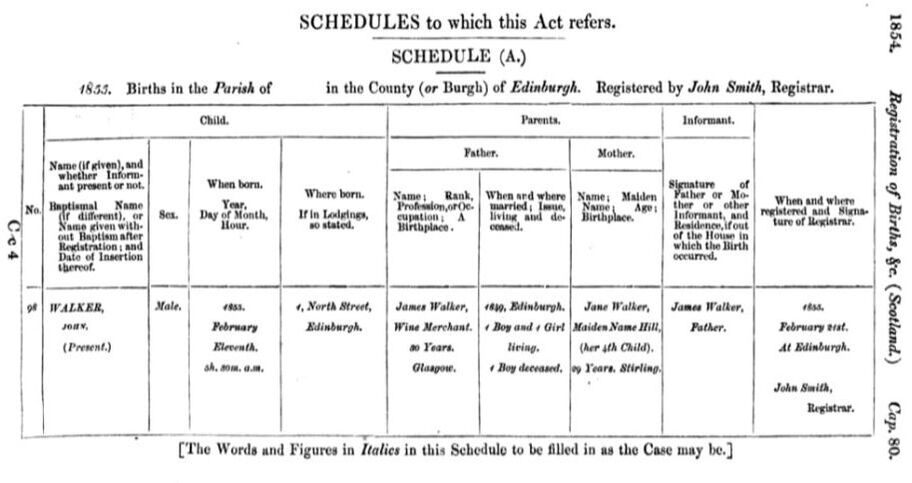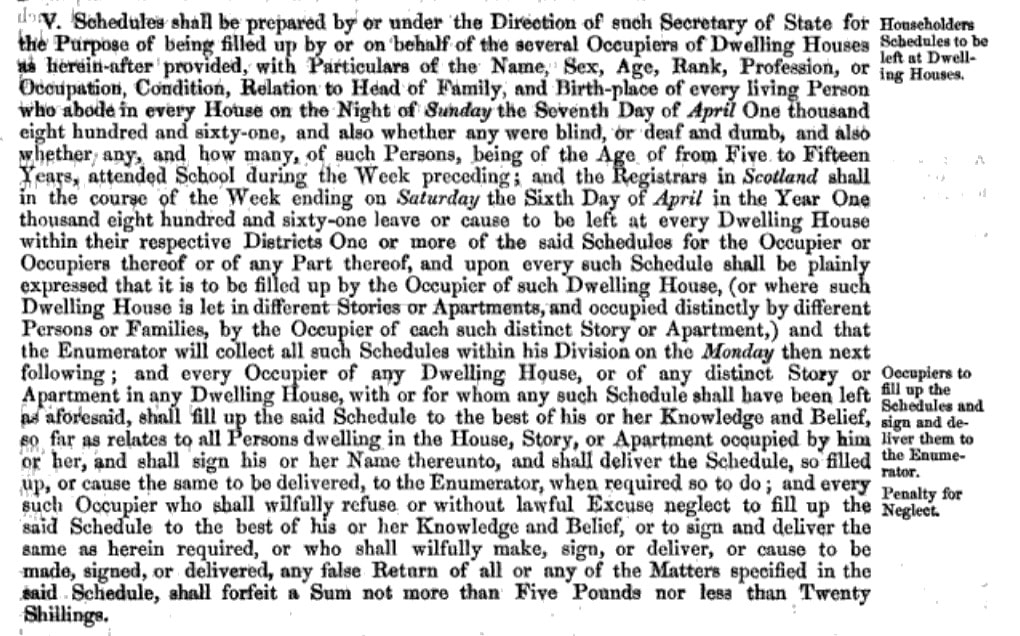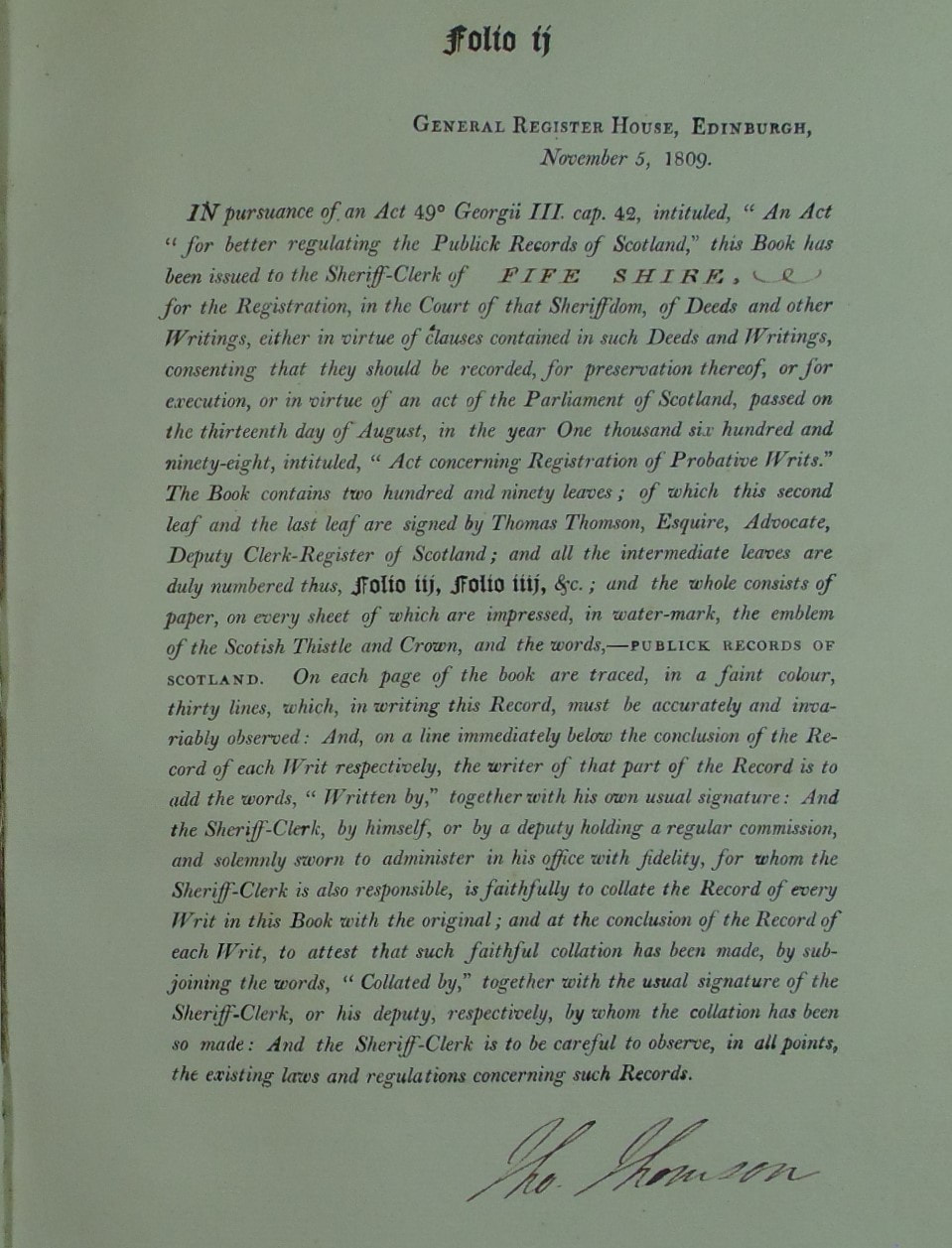|
I've long been an evangelist for the idea that family historians should study the law. I don't mean that every would-be genealogist should go to law school, but simply that an understanding of the law as it stood when our ancestors lived is often as important as a general understanding of the social history of the era in question. Not just because the way our ancestors lived, worked and loved were all to some degree governed by law, but more importantly, because so many of the records we use as family historians to research the lives of our ancestors were creations of law. Take the fundamental records we use to start researching our ancestry - the core records that allow us to build a bare bones family tree and allow us to do genealogy proper (as opposed to family history): birth, death and marriage records. The very existence of these basic building blocks is a matter of law: in Scotland civil registration was introduced from 1855 under An Act to provide for the better Registration of Births, Deaths and Marriages in Scotland, better known as the Registration of Births, Deaths and Marriages (Scotland) Act of 1854. Take the birth record so familiar to any Scottish genealogist and available from Scotland's People. The format and contents of such records were laid out in detail in the 1854 Act, as shown by the example entry given as Schedule (A) shown above. But more importantly, the rules governing the creation, content and management of these records are also laid down by the Act. Understanding these rules is key to understanding what the records are telling us, and how we can use this information in our research. The 77 Sections of the Act set out the rules for the operation of the system of civil registration. Moreover, Section 57 required the Registrar General to maintain indexes to all the register entries from across Scotland, and to make those indexes available for the public to search. This laid the foundations for a system that almost 150 years later would lead to the Scotland's People website and centres, without which modern Scottish genealogical research would be unimaginable. Another core record used by every Scottish genealogist is of course the census. Take for instance the 1861 census. The rules for the operation of the 1861 census in Scotland were set out in Section 5 of the Census (Scotland) Act of 1860, which also stipulated the information to be provided: It's clear that the format and content of the census records as we see them are defined by the legislation setting out the operation of the census. It also clarifies the intended significance of the second-last column in the 1861 census - whether children attended school the week before - so strictly speaking, a school-age child who had been too ill to attend school in the previous week should not be marked as attending school, a situation I have encountered on a couple of occasions in my research. Other Acts have even more direct influence on the records we use. Anyone who's ever read through the Sheriff Court Registers of Deeds will be familiar with the image below: The Public Records (Scotland) Act of 1809 introduced a number of changes "for better regulating the Publick Records of Scotland", as the Long Title of the Act puts it. One reform was to simplify the system of registering deeds, or probative writs, by reducing the number of authorities which were able to record them. Burgh, Barony, Regality and Commissary courts were ordered to stop registering deeds. Moreover these lower courts were required to deliver their existing records to the Sheriff Clerks (or to the Lord Clerk Register in the case of Edinburgh Commissary Court). Section 8 of the Act stipulated that Sheriff Clerks were only to record deeds in register books supplied to them by the Lord Clerk Register, and marked on the first and last leaves (as shown above). So this Act affected both the nature of the physical records we use today, and their preservation.
It's a truism of genealogical research that, in order to truly understand a record and interpret what it can tell us about our ancestors and their lives, we have to understand the context in which the record was produced, and the purposes for which it was created. In many cases, this context is provided by the legislation underpinning the creation of the records. The legislation can often set out the purposes for which the records were created, the rules for creating them, and indeed the physical form and preservation of the records themselves. So if you're now convinced you should start studying historical legislation, where do you go? Well we've recently published a comprehensive index to all Public General Acts passed in the UK parliament between 1801 and the death of Queen Victoria in 1901. This index gives both the short and long titles of the laws, the standard citations used for them, and - crucially - links to digitised images of the texts of the laws themselves. They say that ignorance of the law is no excuse - well now there really is no excuse for family historians to be ignorant of the law. We hope you have fun exploring these laws. If you find anything interesting, feel free to let us know in the comments, or contact us with any mistakes (there are over 10,600 acts in the index, so there's bound to be the odd error).
1 Comment
|
Old ScottishGenealogy and Family History - A mix of our news, curious and intriguing discoveries. Research hints and resources to grow your family tree in Scotland from our team. Archives
November 2022
Categories
All
|
- Home
-
Records
- Board of Supervision
- Fathers Found
- Asylum Patients
- Sheriff Court Paternity Decrees
- Sheriff Court Extract Decrees
- School Leaving Certificates
-
Crown Office Cases AD8
>
- AD8 index 1890 01
- AD8 index 1890 02
- AD8 index 1890 03
- AD8 index 1890 04
- AD8 index 1890 05
- AD8 index 1890 06
- AD8 index 1890 07
- AD8 index 1890 08
- AD8 index 1890 09
- AD8 index 1890 10
- AD8 index 1890 11
- AD8 index 1900 1
- AD8 index 1900 2
- AD8 index 1900 3
- AD8 index 1900 4
- AD8 index 1900 5
- AD8 index 1900 6
- AD8 index 1905 1
- AD8 index 1905 2
- AD8 index 1905 3
- AD8 index 1905 4
- AD8 index 1905 5
- AD8 index 1905 6
- AD8 index 1915 1
- AD8 index 1915 2
- Crown Counsel Procedure Books
- Sheriff Court Criminal Records
- Convict criminal records
-
Workmens Compensation Act Records
>
- Workmens Compensation Act Dundee 1
- Workmens Compensation Act Dundee 2
- Workmens Compensation Act Dundee 3
- Workmens Compensation Act Dundee 4
- Workmens Compensation Act Dundee 5
- Workmens Compensation Act Dundee 6
- Workmens Compensation Act Forfar 1
- Workmens Compensation Act Banff 1
- Workmens Compensation Act Perth 1
- Registers of Deeds
- General Register of the Poor
- Registers of Sudden Deaths
- Anatomy Registers
-
Resources
- Blog
- Contact
- Shop
|
Data Protection Register Registration Number: ZA018996 |





 RSS Feed
RSS Feed
